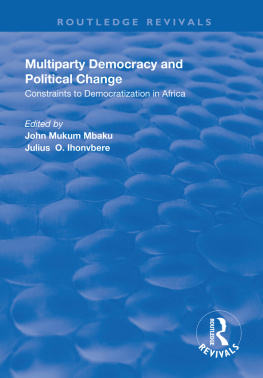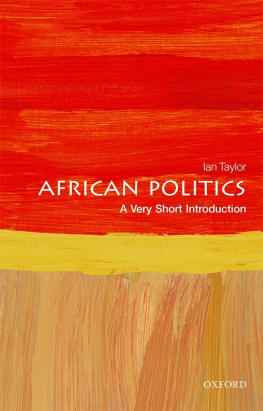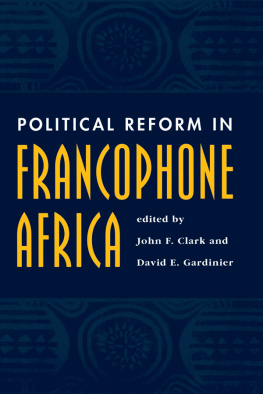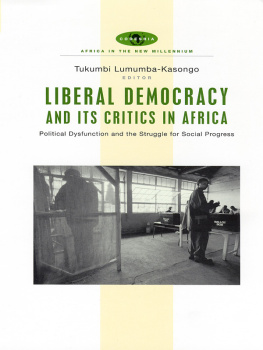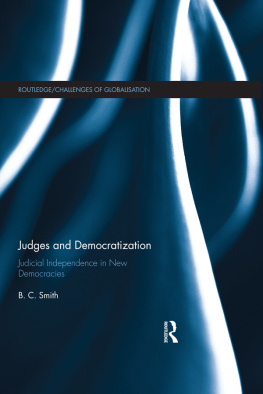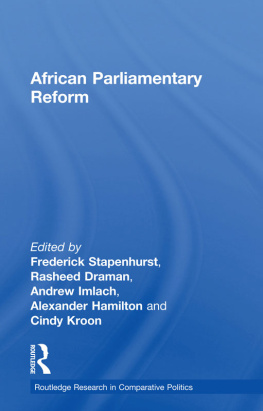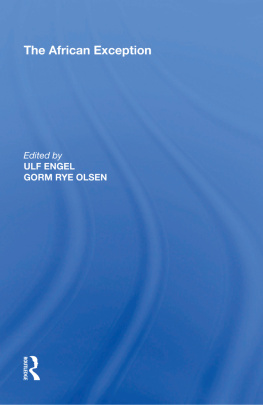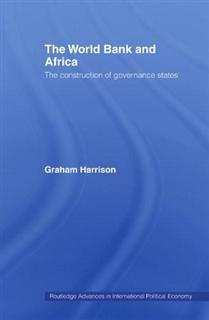MULTIPARTY DEMOCRACY AND POLITICAL CHANGE
Contemporary Perspectives on Developing Societies
John Mukum Mbaku , Series General Editor, Weber State University
Mwangi S. Kimenyi , Series Associate Editor, The University of Connecticut
During the 1989-1991 period, there were several changes in the global political economy that have had significant impact on policy reform in developing societies. The most important of these were the collapse of socialism in Eastern Europe, the subsequent disintegration of the Soviet Union, the cessation of superpower rivalry, and the demise of apartheid in South Africa. These events have provided scholars a new and challenging research agenda: To help the peoples of the Third World participate more effectively in the new global economy. Given existing conditions in these societies, the first line of business for researchers would be to help these countries establish and maintain transparent, accountable and participatory governance structures and, at the same time, provide themselves with more viable economic infrastructures. The Contemporary Perspectives on Developing Societies series was founded to serve as an outlet for such policy relevant research. It is expected that books published in this series with provide rigorous analyses of issues relevant to the peoples of the Third World and their efforts to improve their participation in the global economy.
Also in this series
Hope, K. R., Sr. (ed.) (1997), Structural Adjustment, Reconstruction and Development in Africa.
Multiparty Democracy and Political Change
Constraints to Democratization in Africa
Edited by
John Mukum Mbaku
Department of Economics
Weber State University
Ogden, Utah, U.S.A.
Julius O. Ihonvbere
Ford Foundation
Governance and Civil Society Unit
New York, U.S.A.
and
Department of Government
The University of Texas at Austin
Austin, Texas, U.S.A.
First published 1998 by Ashgate Publishing
Reissued 2018 by Routledge
2 Park Square, Milton Park, Abingdon, Oxon OX14 4RN
711 Third Avenue, New York, NY 10017, USA
Routledge is an imprint of the Taylor & Francis Group, an informa business
Copyright John Mukum Mbaku and Julius O. Ihonvbere 1998
All rights reserved. No part of this book may be reprinted or reproduced or utilised in any form or by any electronic, mechanical, or other means, now known or hereafter invented, including photocopying and recording, or in any information storage or retrieval system, without permission in writing from the publishers.
Notice:
Product or corporate names may be trademarks or registered trademarks, and are used only for identification and explanation without intent to infringe.
Publisher's Note
The publisher has gone to great lengths to ensure the quality of this reprint but points out that some imperfections in the original copies may be apparent.
Disclaimer
The publisher has made every effort to trace copyright holders and welcomes correspondence from those they have been unable to contact.
A Library of Congress record exists under LC control number: 97077172
ISBN 13:978-1-138-32385-8 (hbk)
ISBN 13:978-0-429-45112-6 (ebk)
Contents
Julius O. Ihonvbere and John Mukum Mbaku
Julius O. Ihonvbere
Mohameden Ould-Mey
John Mukum Mbaku
John F. Clark
Pita Ogaba Agbese
George Klay Kieh, Jr.
Eunice Njeri Sahle
Joseph Takougang
Julius O. Ihonvbere
Fran Buntman
Osita G. Afoaku
John Mukum Mbaku and Julius O. Ihonvbere
Osita G. Afoaku received the Ph.D. degree in Political Science with emphasis in International Relations, and Comparative Politics from Washington State University. He currently holds an associate professorship in the Department of Africana Studies at the University of Northern Colorado. He has published articles in the Western Journal of Black Studies, the Journal of Third World Studies, and the Journal of Nigerian Affairs. His current research interests include U.S.-African relations, democracy and human rights issues in continental Africa and the Diaspora.
Pita Ogaba Agbese is an Associate Professor of Political Science at the University of Northern Iowa. His research has appeared in journals as Africa Today, The Journal of Commonwealth and Comparative Politics, Journal of Asian and African Studies, The Journal of International Studies, Third World Perspective, Journal of Peace Research, International Journal of Comparative Sociology, Bulletin of Peace Proposals, and the Journal of Third World Studies. He is the co-author (with Julius O. Ihonvbere) of The State and the Politics of Structural Adjustment in Nigeria (forthcoming).
Fran Buntman was born and educated in South Africa and received the Ph.D. degree from the University of Texas in 1997. In 1994 she was an election observer in South Africa's first democratic elections. Her Ph.D. dissertation, which examined political prisoner resistance on Robben Island (South Africa) under apartheid, won the Outstanding Dissertation Award from the University of Texas at Austin. She has published on Robben Island, attempts by business to shape policy under apartheid, and the South African nonprofit voluntary sector, among other topics. Her research interests include the politics of contemporary imprisonment, racial politics in the United States and South Africa, and policy-making in the new African democracies.
John F. Clark is Associate Professor of International Relations at Florida International University in Miami, Florida. He has done field research in Congo-Brazzavile and Democratic Republic of Congo (Congo-Kinshasa) in the areas of democratization, state development and ethno-nationalism. His research has been published in such journals as Journal of Democracy, Studies in Comparative International Development, TransAfrica Forum, and the journal of African Policy Studies. He is co-editor, with Professor David E. Gardinier, of Political Reform in Francophone Africa (Westview, 1997),
Julius O. Ihonvbere is Professor of Government at The University of Texas at Austin. His research interests are in state-civil society relations, demilitaization, democratization, structural adjustment, globalization, and human rights in the developing world with special interest in Africa. His articles have appeared in numerous international journals including Africa Toady, The Journal of Modern African Studies, International Politics, International Journal, Asian and African Studies, World Development, and the Journal of Political and Military Sociology. His recent books have included Nigeria: The Politics of Adjustment & Democracy (1994); Economic Crisis, Civil Society and Democratization-. The Case of Zambia (1996). Other titles including, Africa and the New World Order; Nigeria: The Illusions of Power (Timothy Shaw); The State and Structural Adjustment in Nigeria (with Pita Agbese); and Fragile Democracies: The Legacy of Authoritarianism in Africa, are forthcoming. He is the recipient of the first Mario Samara Memorial Scholarship Award from the Association of Third World Studies. He is currently Program Officer in the Governance and Civil Society Unit of the Ford Foundation in New York City.
George Klay Kieh , Jr. is an Associate Professor of Political Science and International Studies at Morehouse College. His research interests are in conflict and peace studies, American Foreign Policy, international organizations, political economy, and African politics. His research has appeared in such journals as Journal of Peace Research, Small Wars and Insurgencies, Studies in Conflict and Terrorism, Social Science Journal, Arab Studies Quarterly and the Journal of Asian and African Studies. He is the author of Dependency and the Foreign Policy of a Small Power (1992) and Ending the Liberian Civil War: Implications for United States Policy Towards West Africa (1996).

